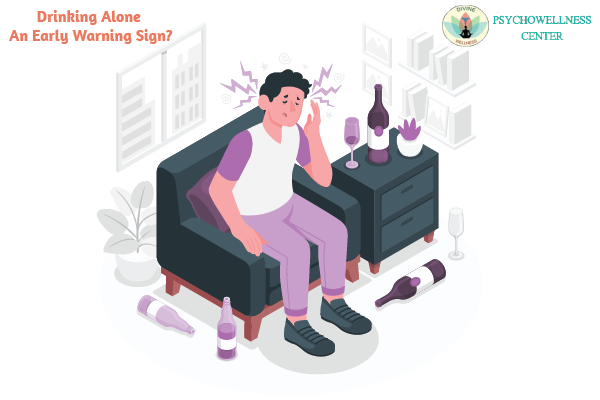The vast majority of alcoholics first tried drinking when they were teenagers, typically for social reasons such as to blend in with their friends, to get over shyness, and to feel more at ease in social situations, etc. A different kind of story, however, will occasionally be told by someone who started drinking alone from the beginning, without friends or other people for social purposes, only for the sake of drinking. Although uncommon, such early, lone drinking does happen occasionally.
Of course, most people start drinking for social reasons, and the majority of them continue to engage in moderate social drinking throughout their lives. Few of them develop alcoholism as adults. What about the early anomalies, the ones without a gathering to attend or acquaintances to make?
These disinterested teenage drinkers piqued the interest of Carnegie Mellon University psychologist Kasey Creswell. She and her co-workers hypothesized that solitary drinkers might constitute a particular subgroup of adolescent drinkers, one more susceptible to heavy drinking and alcoholism in later life. If this were the case, Creswell reasoned, then studying lone drinkers might shed light on the potential risk factors for excessive drinking.
Other studies have demonstrated that drinking alone is associated with higher drinking and more alcohol-related issues. You can talk to the Best psychologist in India. However, it’s unclear which comes first. To put it another way, do heavy drinkers tend to isolate themselves or does drinking alone make you drink more? Additionally, it is unclear why the teenagers decide to drink by themselves. What are they seeking, exactly?
Creswell believed that those who drink alone may be more likely to self-medicate—to use alcohol to dull unpleasant emotions. She conducted the first of-its-kind longitudinal study, which followed a sizable cohort of teenage drinkers into their early adult years, to find out. They discovered some of the teens in treatment centers and others in the general public, thus their drinking habits and histories varied.
At the outset, the teens ranged in age from 12 to 18; all were followed up with at age 25. Over this time, they underwent thorough evaluations that covered drinking frequency and consumption, frequency of lone and social drinking, and other topics. The respondents were also questioned by the researchers about the following circumstances that might have preceded instances of binge drinking:
When you’re lonely, do you drink a lot? Following a fight with a friend? to honor an achievement? … and so on. Finally, they recorded who finally experienced alcoholism.
Teenage drinkers who are drinking by themselves are uncommon, but not extinct. A study published in the journal Psychological Science revealed that roughly 60% of the participants never drank by themselves. They never drank alone; only in company. However, the majority of people—nearly four out of ten—said they did drink alone, at least occasionally. This is greater than the average estimate of solitary drinking, and solitary drinking was far more common among teenagers who had already begun to exhibit early signs of alcohol consumption.
The teenage drinkers who were alone also drank more frequently and consumed more alcohol each time they did. When they first began drinking, they were also younger
Most importantly, Creswell’s poll found that teenagers tended to drink alone when they were in uncomfortable situations, indicating that these teenagers were likely using alcohol as a form of self-medication to deal with their uncomfortable emotions. By the time they became 25, these lone teen drinkers were substantially more likely to experience serious drinking issues, including alcohol dependency.
It’s heart-breaking to consider that these kids are hiding out at home by themselves, utilizing alcohol as a coping mechanism for whatever demons they may be facing. Experiencing these signs can lead to issues in the coming years, consult the Best therapist or Counseling Psychologist. You can search for the Online counsellor.

